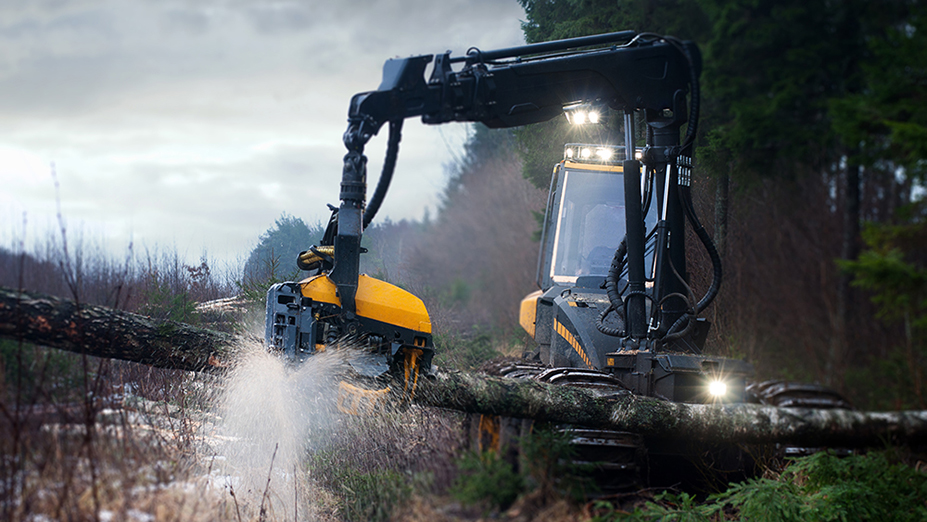How lubricating oil became clean tech
Environmentally adapted lubricants are available in many areas and are advanced clean tech. Degradable and renewable have been key words in the development journey that began 30 years ago and paved the way for many high-performance products.

Chlorine-free paper is a well-known example of an environmentally adapted product. The paper industry decided in the 1980s to invest in new technology that paved the way for new products and reduced emissions. The phenomenon is now known as clean tech and has a clear definition.
“Clean tech means products or services that contribute to a better environment and reduced environmental impact. The products must be commercially applicable and competitive,” explains Torbjörn Brorson, consultant in sustainability issues and adjunct professor at the International Institute for Industrial Environmental Economics at Lund University.
He highlights legislation and commercial demand as driving forces behind development. Legislation starts the ball rolling. Then requirements from customers and suppliers takes developments a step further.
“Companies now want to be one step ahead. They take the initiative without being forced to do so, primarily because green products can reinforce customer relations,” says Torbjörn Brorson, continuing:
“At the same time, it can be difficult to get customers to choose new products. Another challenge concerns how politicians and decision-makers act, for example on legislation and tax incentives. Companies want to have clear rules before they dare invest in new areas.”
Lubricants as clean tech
The first environmentally adapted products arrived on the lubricants market in the early 1990s. They were based on rapeseed oil and the products found their first foothold in the forestry industry.
“This was because tougher environmental requirements were imposed on the forestry industry, partly because there were frequent oil spills of various sizes in sensitive natural areas,” explains Jan Alm, Product Manager Automotive at FUCHS Lubricants Nordics.
Forestry companies, machine manufacturers and oil companies set up project groups that drove development forwards. However, some of the first rapeseed oil-based hydraulic oils were not up to standard. The products were also more expensive, which reduced interest.
“Their low-temperature properties were not that good. There were problems with oxidation and the seals in the machines suffered badly. The problems were eliminated when the products were developed, but unfortunately they have not been forgotten and they affect the view of environmentally adapted lubricants in some industries,” says Jan Alm.

Top quality – environmentally and technically
Environmentally adapted hydraulic oils drove development work on. The company that is now FUCHS Lubricants Nordics took part in many project groups and established its own partnership with researchers at Luleå University of Technology.
“I am proud of the interdisciplinary, well-founded work in which our development department was involved and which paved the way for the products we have today. We have worked with many operators and carried out extensive environmental studies, lifecycle analyses of products and much more besides as important steps along the way,” emphasises Milan Kopp, HSE Advisor, Products, at FUCHS Lubricants Nordics. He continues:
“At an early stage, we established sustainability criteria for the products that largely still apply today. The criteria are applicable separately and independently of each other, for example that lubricants must be biodegradable, contain renewable raw materials, produce energy savings or contribute to a better working environment.”
An important development was when environmentally adapted products started to be based on synthetic esters and later on saturated esters. The proportion of renewable raw materials in such products can be high, over 80 per cent. Green lubricants must also meet degradability requirements.
“This opened the door for the high-quality products we have now, i.e. products with high technical performance, a long service life and good air and water separating properties that cope with wide temperature ranges,” Jan Alm says in summary.
Large energy savings
In addition to the forestry industry, environmentally adapted products started to be developed for the power industry as well.
“The unique feature is that these products reduce friction and bearing losses in turbines, which can result in large energy savings. If all power stations in Sweden were to use this type of oil, the energy savings achieved would be equivalent to the annual consumption in a small Swedish town,” explains Jan Alm.
FUCHS now offers environmentally adapted lubricants for most major industries. One of the challenges is to persuade the contracting industry to make the leap to clean tech. Municipalities and other public operators make requirements but environmentally adapted lubricants are used very rarely.
“This is partly on account of the misunderstandings that persist. That the products are messy, have a short service life, damage seals, are unable to cope with cold, etc. We have carried out studies and are able to show, point by point, that our environmentally adapted lubricants are considerably better than traditional oils,” says Jan Alm.

Global outlook
Working with environmentally adapted lubricants also involves challenges at global level.
“While bio-based lubricants are more expensive and European authorities do not make it a statutory requirement for the products to be used in sensitive environments, customers’ interest will remain a challenge for us. At the same time, the lubricants industry and FUCHS in particular offer a wide range of bio-based alternatives which are often linked to improved technical performance, for example higher energy efficiency and lower emissions,” says Rolf Luther, Head of Advanced Development in the FUCHS Group.
He explains that these products currently have a modest market position, but requirements from bodies such as the EU Commission may change this.
“The Commission has published recommendations in regard to bio-based products in general, asking for the mandatory use of bio-lubricants in dedicated applications and areas by legislation.”
Standardisation on the agenda
Standardisation is currently an important subject in FUCHS’s sustainability work.
“People tend to have different ideas about what sustainability is. Consequently, we are helping develop a sustainability standard based entirely on the conditions in our industry,” says Apu Gosalia, Vice President Sustainability & Global Competitive Intelligence at FUCHS.
He stresses the importance of developing a joint standard together with other lubricant companies, which everyone can support and which promotes sustainability work throughout the industry.
“If we fail to develop a standard ourselves, the alternative is that someone else does it for us, which may pave the way for a system we don’t want at all.”
The standard comprises sustainability parameters such as water and energy consumption, waste generation and carbon dioxide emissions. The idea is also to include the environmental impact of suppliers in the chain.
The initiative has been taken among German companies, but Apu Gosalia hopes that the end result will be a standard that lubricant companies throughout Europe will support.

